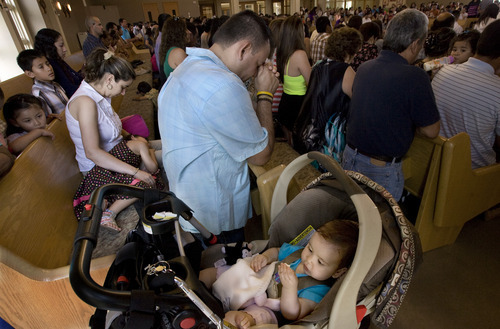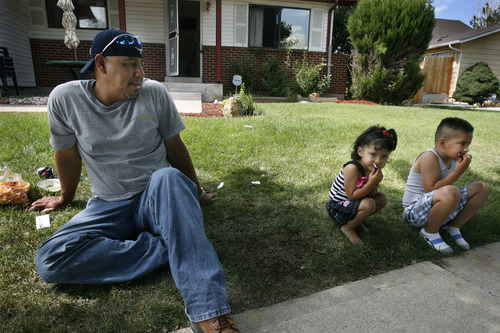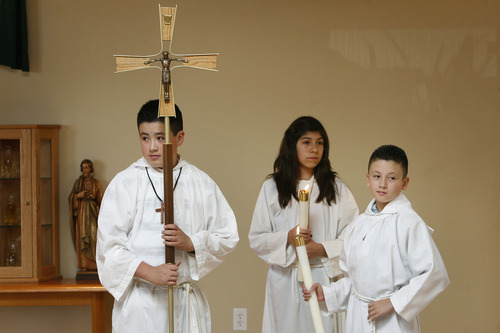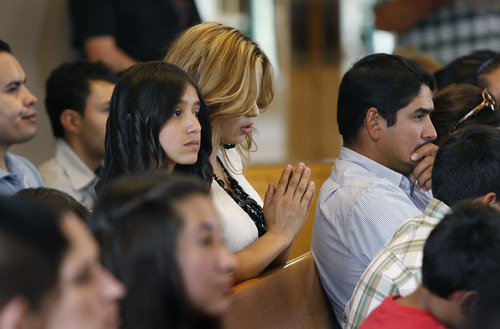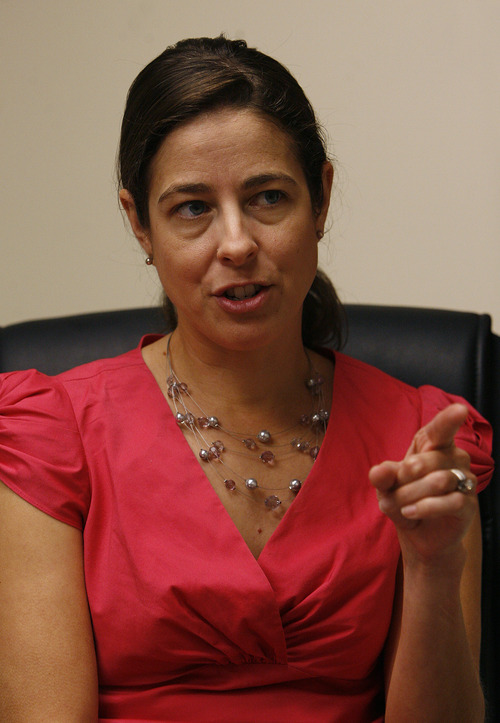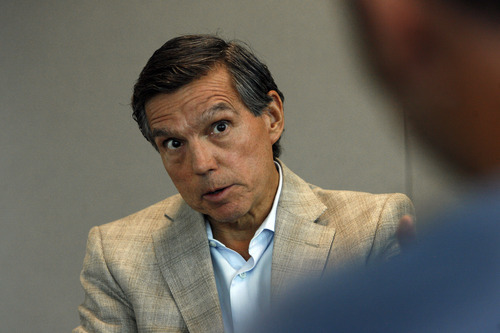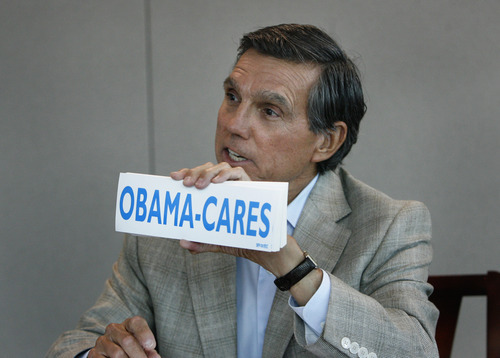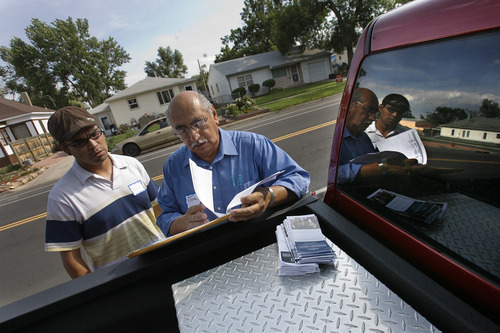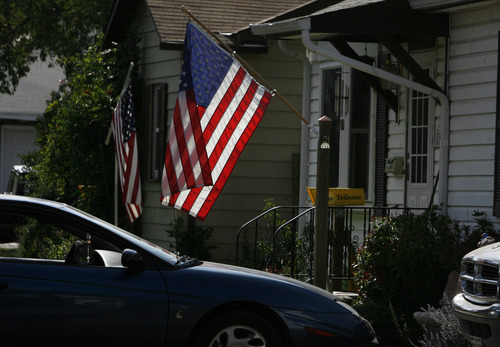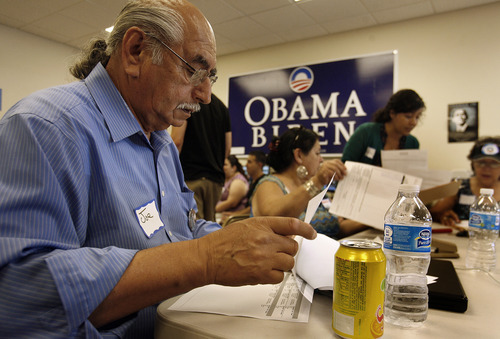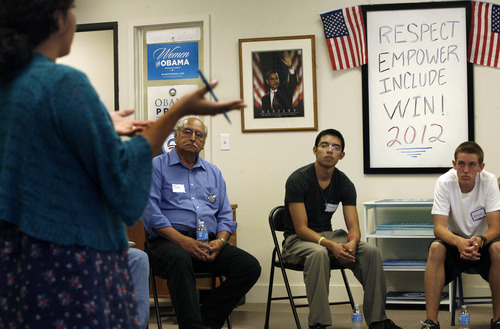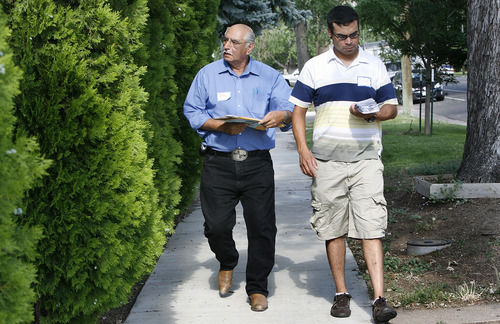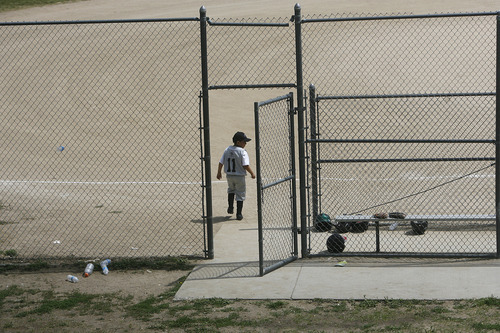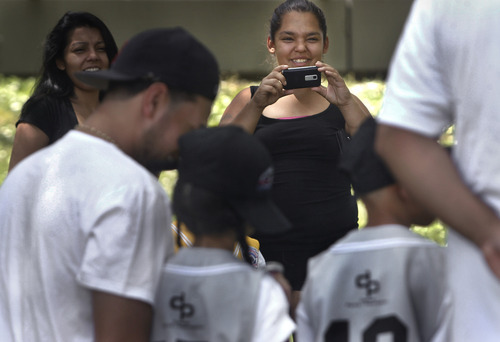This is an archived article that was published on sltrib.com in 2012, and information in the article may be outdated. It is provided only for personal research purposes and may not be reprinted.
Denver • Joie Gutierrez is Mitt Romney's problem. Not far up the highway, Barack Obama's problem is named Jaime Portillo.
Both are eligible voters. Neither plans to exercise their right in November. And no amount of cajoling, convincing or campaigning will change that fact. Instead, their votes will be among thousands left on the table come Election Day in Colorado. That they are Latino is perhaps less surprising.
According to U.S. Census data, there are about 664,000 Latino adults living in Colorado and a survey released this year by the group Latino Decisions shows there were 340,798 registered Hispanic voters in the state. That means 49 percent of Hispanics in the Centennial State aren't registered to vote. The reasons are varied — apathy, belief that a vote doesn't matter, lack of time or simple dissatisfaction with the two candidates.
But campaigns for Obama and Romney are reaching out to that demographic through canvassing, phone banks and a blitz of bilingual advertising on television and radio.
Gutierrez doesn't care. She's got other things on her mind.
—
'I don't choose' • The 28-year-old mother of five is trying to get her 11-year-old son to pose for a photo in his baseball uniform at Rude Park, which is just west of downtown in a Latino-heavy neighborhood.
At the same time she's juggling a camera and drink while coaxing the boy to smile on a hot Saturday morning, her youngest, 3-year-old Donovan, is driving her crazy as he keeps dropping his pants and standing there with exposed diapers and a goofy grin.
Gutierrez said even though she registered to vote at 18 ("My dad made me"), she has never cast a single ballot. She said politicians — especially at the presidential level — are disconnected from her daily life.
"I feel like they're going to do what they're going to do, regardless of my choice," she said. "So, I don't choose."
If she had to vote, she said she'd vote for Romney. She likes his values. But that voteisn't going to happen.
Raymond Rodriguez, who coaches the youth baseball teams at the park, said it's a common refrain in the Latino community. He said sometimes it's related to the person's background — coming from countries where elections aren't transparent, and people believe the winner is pre-determined.
"They don't have a lot of confidence in voting," Rodriguez said. "They can often feel their vote doesn't count."
According to a 2011 Pew Hispanic Center survey, that was the answer given by 14.9 percent of Latinos asked why they don't participate in elections. It was second only to the 25.8 percent who said they were too busy or had scheduling conflicts that kept them from voting.
Joe Perez has heard all of the excuses before. So he's on a mission to bring them into the process.
—
Door to door • On a quiet Sunday afternoon in Greeley — a largely agricultural community in northeastern Colorado — Perez strides up to house after house with a clipboard in hand and a smile beneath a bushy mustache.
He's working with the Obama campaign and spends hours training people to knock on doors and register people. Perez has been at it for months, working out of his garage and from an Obama office across from the University of Northern Colorado campus and in a strip mall, which includes a tattoo shop and a Chipotle Mexican Grill restaurant.
Perez said the trick is persistence.
"It can take five knocks," he said. "So we keep going back."
He has concerns, though, about November. After the 2010 census data came out, Weld County — where Greeley is — decided not to offer ballots in Spanish as it had in 2008 under the Voting Rights Act. That's because the Latino population decreased under a formula used under the law to determine if voting needs to be accommodated in alternative languages.
That could affect turnout, Perez said.
"If the ballot were in Spanish, it would be a lot easier for some," Perez said. "If we say 'to vote is American,' why would you make it more difficult for someone?"
Obama's campaign also has brought back some of its heavyweights from 2008 to try to match or surpass Latino voter turnout back then.
Federico Peña, who again is a national co-chairman for Obama, said he's been touring the state and making the pitch to disaffected Latinos who don't appear motivated to go to the polls.
The former Clinton administration Cabinet member and Denver's first Hispanic mayor said trips to Pueblo and parts of Adams County have helped him see Latino concerns and allowed him to try to connect the dots for residents.
He tells them in speeches and in personal conversations about the president's power on health-care reform, college-tuition aid and comprehensive immigration reform. Throw in the constant chatter among candidates and pundits about the importance of the Latino vote and Peña says it gives Hispanics skin in the game.
"For the first time in my life, Latinos don't ask, 'Why aren't they paying attention to us?'" Peña said. "Now they realize they are going to make the difference in battleground states."
But that might not happen right away.
José Suárez, a professor of Hispanic Studies at the University of Northern Colorado, said voter apathy among Latinos may stick around until future generations improve their socio-economic status.
"It's going to take at least a generation or two," he said. "As they climb up, I think you'll see less apathy and greater participation."
For Obama to win Colorado and its nine electoral votes this year, Peña said he'll need a performance similar to 2008 — when the president won the Latino vote 61 percent to 38 percent in the state, according to exit survey results from the William C. Velasquez Institute. Obama eventually won Colorado by nine points overall.
In that same Velasquez survey, Latinos cast 13 percent of the total votes. Peña said the election will again come down to turnout, and he's got an ambitious goal.
"If we just register 5 percent more, we'll be fine," he said.
—
No time for politics • Jaime Portillo would likely vote for Obama, but with a job, three kids and another on the way, he said he doesn't have time to follow politics.
The 33-year-old was coming out of a Spanish-language Mass at Immaculate Conception Catholic Church in Lafayette after hearing a pitch by Salvador Luna and Carmen Medrano about the value of registering and casting a ballot.
"I know voting makes a difference, but I never really paid attention to it," Portillo said. "I know it's important, and I've been meaning to get to it."
But driving delivery trucks 50 hours a week doesn't leave him much time to consume news or information. And he said when he's home, that's time spent with his wife and children.
He said he would try to register but with a new child coming and work not showing any signs of slowing down, he admitted it was unlikely he'd cast a ballot in November.
"I have to support my family first," he said.
Luna, who is working with Medrano's non-profit to register 8,000 Latinos in Arapahoe, Adams, Boulder, Denver and portions of Jefferson County before Election Day, said sometimes it's easier to get people interested in local and state-level races.
He also said it takes a lot of time to educate them on how government works.
"I tell them, 'If you want to make a change, you have to participate,'" he said.
Medrano said recent actions by the president have shown Latinos that Washington does have an effect on their lives. She said that effect became clearer when the Obama administration announced its directive to prioritize deportations and administratively close cases of those who have no criminal record and also when the president issued an order that allows children brought to the country illegally to pursue a college degree and get a work permit. But she also said those moves "riled some people up," and they registered to vote so they could support Romney.
"We hold community forums and, after Obama made his announcement, more than 100 people showed up," Medrano said. "Normally at our forums, we might have 16 or 17 people show up."
—
Romney outreach • Christine Mastin is an immigration attorney in Greenwood Village and is overseeing outreach to Latinos in Colorado through the Juntos con Romney (Together with Romney) program. That effort has included a series of Latino phone-bank nights, advertising in Spanish and canvassing Latino neighborhoods in a quest to appeal to Hispanic voters throughout the state.
The campaign hit a speed bump with the resignation of Lizbeth Norris-Cohen. She was named Hispanic Outreach Director in April, but she stepped down for personal reasons in June, Mastin said. Alvaro Day was named to the post in July.
Mastin said the message that is resonating among Latinos — and all voters — is jobs and the economy. She said there is frustration among Latinos who don't think Obama has done enough on immigration reform, and that's where there's opportunity to get them into the voting booth.
"That's the number one priority," she said. "To turn out the vote."
Mastin, the daughter of a dad who was in the Peace Corps and a mother who worked in farm labor camps in California, said she understands the drive immigrants have to succeed in a new country and that Romney wants to help them.
"He wants to give you the tools to start your own business," she said. "He respects you as a person and he wants you to succeed."
Nick Valenz said that might be true — but he's not voting for anybody anyway.
—
Empty promises • Sitting on the front lawn in the Montbello neighborhood, Valenz is a former Marine who voted for George W. Bush in 2004, sat it out in 2008 and will do so again this year. Obama, he said, "hasn't done s—-." He thinks Romney dug himself into a hole during the Republican primary with his talk about illegal immigrants self-deporting.
"He disrespected Hispanics," Valenz said.
In Valenz's mind, there isn't a good choice out there.
"They promise so much, but they don't do anything," he said. "When they get power, they forget what they promised."
The 35-year-old said his construction company did $500,000 worth of business last year. He said he'd like to see "a visa system that actually works" so he could hire willing workers, but he thinks nobody is interested in fixing anything.
His dissatisfaction is so strong, he said he sometimes wishes he could just cash out and move to another country. But then with a laugh he said it's probably no better anywhere else — noting that in some countries, voting is compulsory.
So his choice in November will simply be to not choose at all.
And he won't be alone.
dmontero@sltrib.com Twitter: @davemontero —
Swinging the vote: About this series
The Salt Lake Tribune, in partnership with the Institute for Justice and Journalism at the University of Oklahoma, explored the Latino vote in two Western battleground states in this year's presidential election. In this first part, the focus is on Latinos in Colorado not participating in politics. In part two, The Tribune explores the home foreclosure crisis and its potential impact on the Latino vote in Washoe County — a swing county in the swing state of Nevada. Both neighboring states of Utah are considered critical to victory by the Obama and Romney campaigns, and both acknowledge the importance of the Latino vote. —
Editor's Note • Podrá encontrar este artículo traducido al español en nuestra página de Internet


